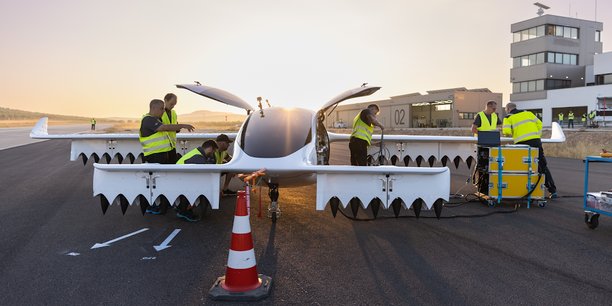The southwest of France is already the cradle of several electric or hybrid aircraft projects including Aura Aéro (Toulouse), Elixir Aircraft (La Rochelle) and Voltaéro (Saintes) but also Ascendance Flight Technologies which develops VTOL, these vertical take-off and landing gear. And it is in this niche that the regional ecosystem has a good chance to welcome a new player in the coming months with the Bavarian startup Lilium, which is also positioning itself in VTOLs. The German company announces it “currently analyzing several potential sites in France to expand its industrial footprint, including those in Nouvelle Aquitaine – a region with strong capabilities in aeronautics and battery production -, and discussions should conclude in the coming weeks”. Investment revealed on the occasion of the Choose France summit, which takes place on Monday, May 13 at the Elysée in the presence of many foreign business leaders. The presidency boasts of a “record” harvest this year with 56 projects for a total of 15 billion euros.
Mentioned 850 job creations
The government confirms “progressive discussions” with Lilium on “ future expansion of its footprint industrial with facilities in France and subsidies and loan guarantees associated (…) PSeveral regions are considered, including Nouvelle Aquitaine. » Lilium, for its part, mentions for this factory intended to supply the world market ” a total investment that could reach 400 million euros over several years and that could create up to 850 new direct jobs. »
Created in 2015 by former Airbus employees and based near Munich, Germany, Lilium is developing a fully electric vertical takeoff and landing aircraft, the prototype of which was unveiled in 2019. The first example will be officially presented at the end of May at Ebace (European commercial aviation convention and exhibition), at Geneva airport, after obtaining a first certificate in November from the European Aviation Safety Agency. ” We are the only manufacturer in the world with a certification base for eVTOL aircraft in Europe and the United States », Underlines the German company.
Capable of transporting up to six people, this small electric plane is designed to be used for private flights, passenger flights, or without a seat, for air cargo. Lilium plans to connect cities across distances between 40 and 200 km at launch, “and up to 500 km in the long run”, at speeds of up to 300 km/h. Enough to target the light aviation market on regional routes, which are most likely to pioneer the adoption of electric aviation by 2030-2035.
780 devices already ordered
The start-up, which employs more than 950 people, announced at the beginning of May the start of mass production of its electric aircraft in its factory in Wessling, Bavaria, for a capacity of around one hundred units per year. But Lilium is preparing for a rapid increase with 780 units already ordered with both firm orders and memorandums of understanding with operators in the United States, South America, Europe, Asia and the Middle East. It signed at the end of 2023 with Lufthansa, the main European air transport group, ” strategic partnership on the operation of electric vertical take-off and landing in Europe “. It is especially about dealing with ” ground and flight operations, maintenance, crew and pilot training “.
According to the ranking of the consulting firm SMG, about thirty companies entered the race to build VTOLs. Among the most prominent, another German company, Volocopter, which hopes in particular to test its flying taxis for the 2024 Olympics For its part, Lilium, which works with many first-tier suppliers, including famous French players such as Saint-Gobain. Michelin, Expliseat and Ratier-Figeac, are planning their first test flight at the end of 2024. Commercial entry into service is then expected in 2026 at the earliest.
A handful of foreign investments announced in New Aquitaine
In addition to the ambitions of Lilium and those of EMME’s nickel and cobalt conversion project for the battery market near Bordeaux, a number of foreign investments in New Aquitaine were announced this Monday. Belgian chemist Solvay will spend €100m converting its La Rochelle factory to launch the first phase of a large-scale production unit of rare earths, essential for electric car engines. The Indian group Motherson will mobilize 150 million euros to acquire AD Industries, in Brive (Corrèze), to invest in the aerospace sector. And other investments also come from Acciona Energia (renewable energies, Spain), Essity (hygiene and health, Sweden) and Iveco (electric buses, Italy).

